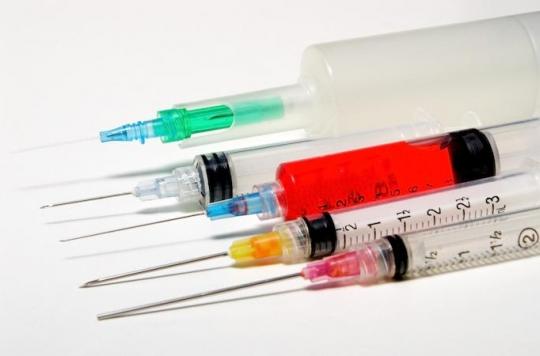A confidential ANSM report suggests that aluminum adjuvants in vaccines are not without risk to health.

As a shadow of a doubt … Used as an adjuvant in many vaccines, aluminum is not as safe as claimed. In any case, this is what is suggested by a report from the scientific council of the National Medicines Safety Agency (ANSM), submitted in March but never made public. Hypotheses that deserve to be explored, according to the director of the ANSM questioned by our colleagues from Parisian.
The journal reveals the main lines of the discussions conducted with the team of Prof. Romain Gherardi, at the Henri-Mondor hospital in Créteil, which is working on the toxicity of aluminum-based adjuvants – without calling into question the interest vaccination. The two leads that emerge from these interviews could explain certain serious complications linked to the injection of vaccines – such as macrophage myofasciitis.
Even at the low doses used, aluminum is able to accumulate in the body, causing long-term neurotoxic damage. The other hypothesis is genetic in nature : Henri-Mondor researchers have identified 7 genes overrepresented in patients who have developed macrophage myofasciitis.
A novelty compared to the elements already advanced. Why actor takes stock of the state of scientific knowledge and the positions of learned societies.
What is an adjuvant used for?
The purpose of vaccines is to protect against infectious disease by “preparing” the immune system. For this, the organism is exposed to an antigen, against which it develops antibodies. But these proteins are not enough to trigger a sufficient response. Adjuvants are therefore used in order to activate the specific immune response more efficiently.
Aluminum is the most widely used of these. In particular because of its security, but also because it allows reduce The quantity of antigens administered at doses “negligible with regard to food, cosmetic or professional intake”, according to the Academy of Pharmacy.
Its “mechanism of action is based on its deposition effect at the injection site,” explains the Academy of Medicine in its report. A gradual release of the vaccine antigen occurs. »Another advantage: it improves the production of antibodies. “The injection site should preferably be intramuscular because the immune responses and local tolerance are better than by the subcutaneous route”, however specifies the academy.
What are its effects on the body?
Like any medicine, vaccines are not without side effects. They are most often mild, but a few severe cases have been attributed to them – not always with good reason. If the trail of autism, a time attributed to aluminum adjuvants, has been ruled out, another pathology is indeed associated with this substance: macrophage myofasciitis.
This very rare disease is characterized by muscle damage due to the infiltration of macrophages impregnated with aluminum. At the origin of its discovery: the team of Prof. Romain Gherardi.
But macrophage myofasciitis is puzzling. 500 cases were observed between 2002 and 2013… then only one. Another surprising element: France concentrates the vast majority of patients. Which correspond to a specific profile. These are mainly adults “exposed to a high number of vaccinations containing aluminum in the previous 10 years”, precise the High Council for Public Health (HCSP). Infants, on the other hand, seem spared.
The World Health Organization (WHO) brings several hypotheses to this strange phenomenon. First of all, the practice of biopsies is specific to France. In addition, the administration of the vaccine has changed in the country. It is now done intramuscularly. Finally, the increased detection rate could influence detection.
Are there any alternatives?
“Aluminum salts have been added to vaccine antigens since 1920 without any country or official body ever questioning the merits of this addition or the safety of vaccines containing this adjuvant”, underlines the Academy of medicine. This has not prevented the development of other forms of adjuvants.
Squalene, bacterial derivatives and other artificial vesicles can replace aluminum when the latter is not effective – against influenza for example – or insufficiently – against papillomavirus in particular.
As for calcium phosphate, regularly mentioned by opponents of vaccination, it is no longer used. Tested by the Institut Pasteur, this adjuvant has delivered contradictory results. The HCSP reports “antibody levels equal or lower, except as a reminder, than aluminum-based adjuvants” for absorption that is half as efficient. Insufficient reliability which prompted its abandonment.
As it stands, the Academy of Medicine concludes that aluminum-based adjuvants remain “essential for the immune response”. Finding other alternatives would also require 5 to 10 years of research before becoming available.
.















